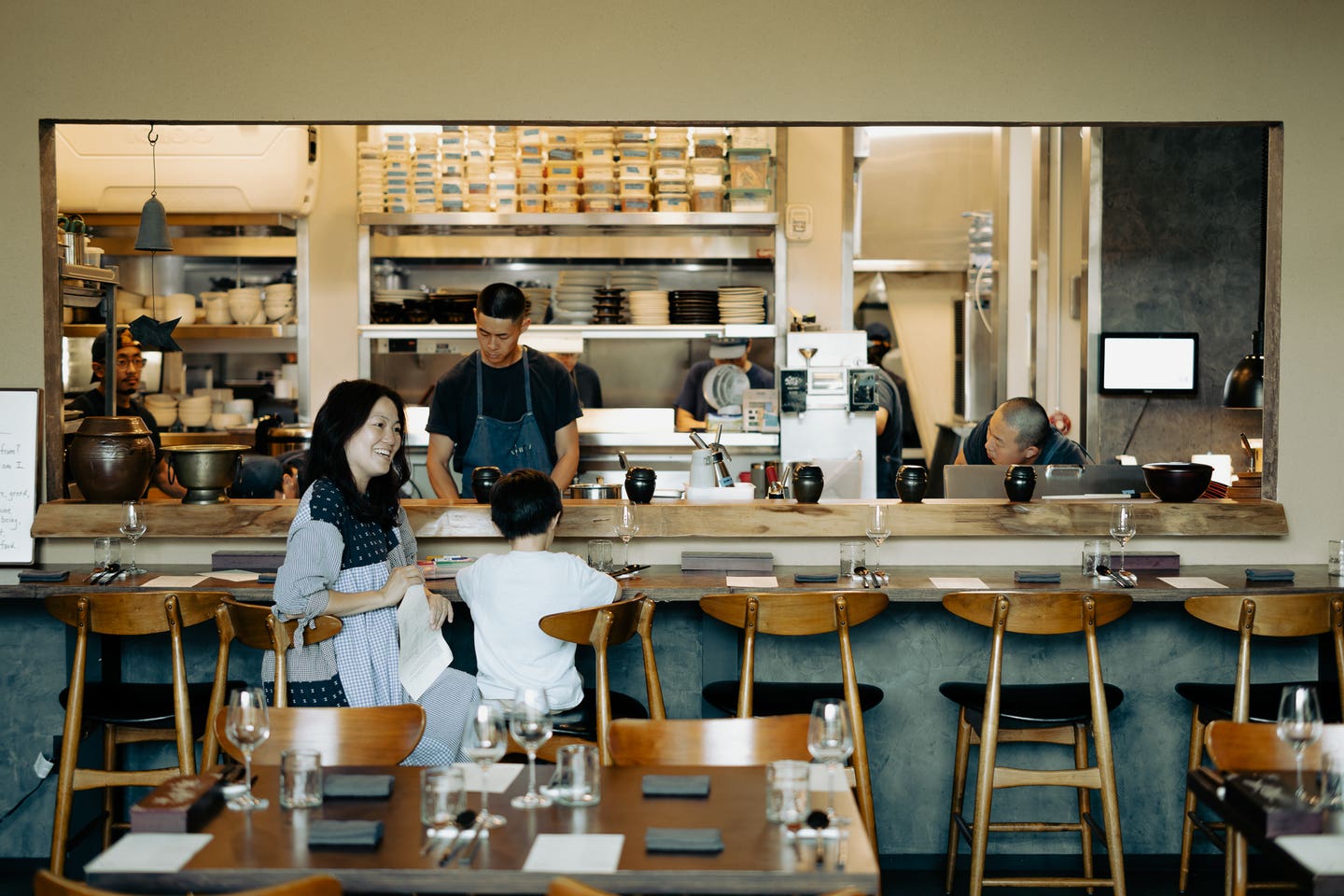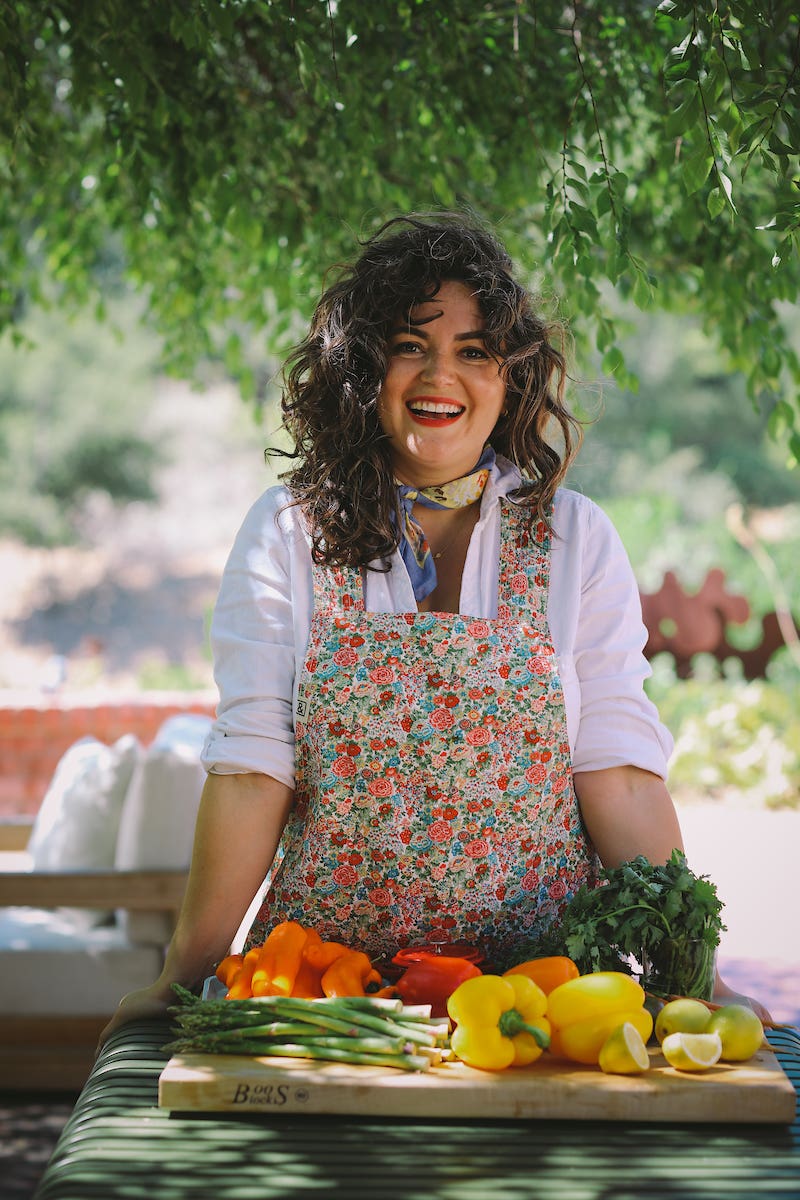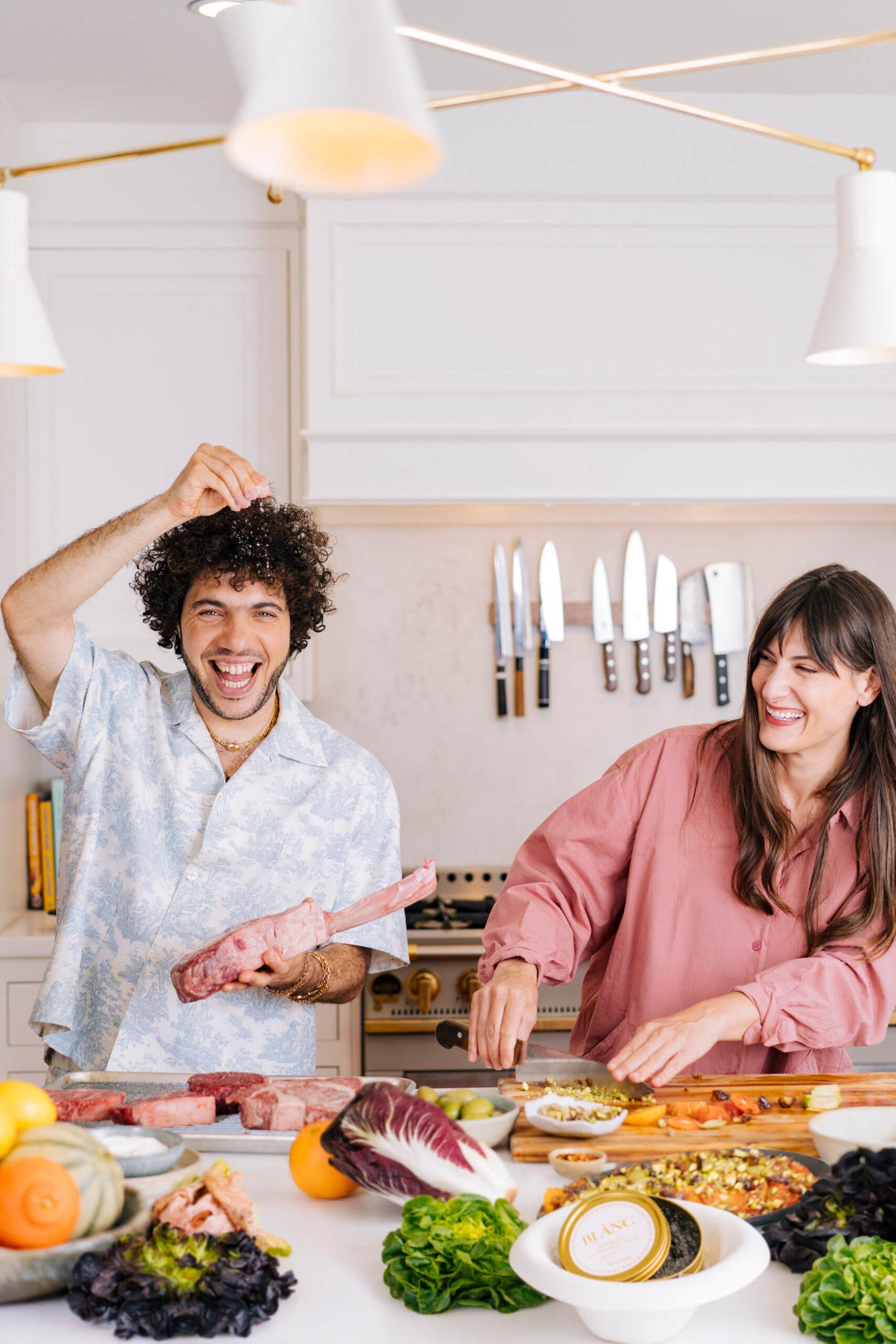Diego Argoti | Poltergeist
At Echo Park’s Poltergeist, Diego Argoti runs a food lab for growth.
by Amanda Lanza, photos by Alan Gastelum
It’s Monday and Diego Argoti is in the kitchen at Poltergeist going through his order list for Tuesday’s opening. The restaurant is closed and absent of the usual background sounds of its host arcade space, Button Mash, with its pinball rings and the racking of skee balls.
Chef Argoti has had a true glow-up. After leaving his sous chef position with longtime mentor Ori Menashe during the pandemic, he channeled his creativity and frustration into the spontaneous and vibe-y street pasta pop-up Estrano. Estrano became infamous for creating a basement-show-style food experience serving unconventional pasta dishes like pumpkin spice ravioli and hot pocket agnolotti. Over the last few years, Argoti has garnered a reputation as the long-haired rebel chef who reigns as LA’s king ofwhat Eater dubbed “Chaos Cooking.” Just as Estrano seemed to be peaking with great press and three-hour-long waits, Argoti unexpectedly snatched the opportunity to create a permanent home with his friends Gabe Fowlkes and Jordan Weiss, the owners of Button Mash. In February 2023, they opened Poltergeist inside Button Mash, putting Estrano on pause and launching Argoti onto a new journey.
Now the hum of refrigeration feels like a great setting for Argoti’s distinct confidence and sense of peace. I trail him as he populates his inventory list and gives me a kitchen tour. The kitchen’s layout was redesigned to meet his ideal workflow and keep everyone focused on executing the dishes with urgency and care.
“Some of the cooks would go get their tickets, look out of the pass, and kind of just hang out,” he says. “So, I pushed everything together and now, if you need to go back to the walk-in, it’s very noticeable. It also provided a cool space so systemically everyone is working together.” Argoti’s attention to detail in the spotless stainless steel kitchen shows his comfort in this new role and routine.
As we walk and talk, I can also feel how in tune Argoti is with his many years of experience in classically structured kitchens, and how they have informed his understanding of a dining service’s function and flow, as well as shaped his management style. When we head into the bar area, he says, “In the beginning I started to see more of the brigade system because it was habit. I wanted and want things to be perfect, but what is perfect, and when does it stop? One of the hardest parts is understanding when and how to raise my voice, or is it even necessary to do it at all?”
The dismantling of the military-inspired and fragmented brigade system has been a deep-rooted topic for restaurant workers. The brigade-style kitchen has yielded the classic stereotype of the screaming hard-ass chef who berates their staff and leads with an iron fist. Many hospitality industry thought leaders and business owners are working towards reimagining a system that works best for them and their teams.
For Argoti, moving into Button Mash and taking over the kitchen has initiated learning the ups and downs of being a leader and also understanding where his brigade background fits into his style and the experience he wants for his staff.
“I always had this idea of the way (I experienced restaurant) kitchens was not the way I wanted to run kitchens,” he says. “Now that I am running one, I realized that the things I wanted to say, how I said it, and how I directed things became identical (to what I’d experienced) because it was the only way I knew.”
It’s been humbling and rewarding for Argoti to check himself. His personal inquiries have set him on a path to find inspiration in creating an uplifting and supportive environment for his team.
“Being a leader, I get to see everyone every day and the goal is progression,” he says. “I remind myself of that all the time. When we first opened, I realized how intense I was and how much I was raising my voice. I have very high expectations and I understand how things should be. I would see my staff progress so well and how one error could ruin their whole night. Adding more pressure to that didn’t work. I would have to leave the kitchen because that’s not someone I wanted to be.”
Not only is Argoti aiming to create an encouraging and welcoming culture in his kitchen, but he is also defying traditional roles and responsibilities. His efforts are focused on making sure his staff has a vastly different experience than he did in the terms of both structure and skills. In a brigade-inspired kitchen structure, cooks learn one station at a time and can stay on it indefinitely. For example, a cook can master the salad or cold station but potentially never work the grill station or know how to execute any of the dishes assigned to that station. At Poltergeist, things are intentionally different. Every cook is trained on every station, all staff spins the ice cream during service, and everyone plates dessert, including the owners of Button Mash who manage the pass and do expo (calling out the orders and putting finishing touches on the plates) every night.
“My staff doesn’t have to go through the shit that I went through,” Argoti says. “I worked off the clock 5 hours a day for ten years and had pots and pans thrown at me. I don’t want people to experience that. I am happy with the experience I have had in the restaurants I have worked in, but I don’t feel like I owe them anything, and I wish I’d spent a little less time there.“
Argoti is not alone in his journey from a spontaneous street food pop-up anomaly to an executive chef running a kitchen with set hours. Gabe Fowlkes and Jordan Weiss, the owners of Button Mash, have helped him develop his business acumen and restaurant financial literacy.
“My relationship with Jordan and Gabe has always been supportive,” he says. “Jordan has always been a friend and someone I call when I need help. He has allowed me to experience and understand the financials. I can take risks here and understand the impact.”
At Poltergeist, the operation is run with care and support from the top down, an approach that is still not the standard in the restaurant industry.
Button Mash was previously the home of another beloved pop-up-turned-brick-and-mortar, Starry Kitchen, for many years, and more recently, Tacos 1986 also did a brief stint. In 2022 Argoti started to take over the bar menu, hosted a series of pop-ups and collaborations and, in February 2023, Poltergeist came into being.
“When we created the menu, I wanted 12 items in 3 sections, small, medium, and large… A big influence was what was going on in New York; Jupiter, Bonnie’s, Foul Witch, and the new Superiority Burger have been really cool. Jordan sends me things all the time and it’s been really influential. For a while there, we were eating through Instagram.” The compatibility between Button Mash and Argoti’s brain is self-evident.
The dining area in Poltergeist is both clean and playful with pastel-colored dishes and stamped napkins with three small spooky skulls. The narrow, vertical menus are flanked with elongated ghost-like figures, headed with the drippy Poltergeist logo in iridescent foil, and shimmering cutlery to match. The dishes at Poltergeist themselves arise from Argoti's deep culinary knowledge and curiosity.
“I continue to study food,” he says. “I love imagining how things work.”
Guests can order the Poltergeist classic hits, including Green Goddess Salad with coconut lime leaf vinaigrette and pandan flakes—a nod to Starry Kitchen, Broccoli Beef Ravioli with short ribs and browned butter, and a whole Grilled Dorade, or Mediterranean whitefish, served on a malawach (buttery flatbread—so good) with blueberry gooseberry chili crisp. The menu crosses culinary borders and draws parallels across cuisines internationally that truly come to make sense once you eat them. Dining in the arcade setting also creates an ambiance of curiosity and playfulness for both guests and cooks; it’s the most fitting space in the city for Argoti’s shift into a grounded brick-and-mortar space.
Argoti was originally named LA’s King of Chaos Cooking because of his unconventional pairings that make connections between cuisines from around the world.
“I like to play around with feelings a lot,” he says. “I like to do things that create memories I have never been a part of and can only imagine.”
The act of imagining includes the food of his heritage. Argoti grew up in what felt like the only Latin family in Burbank with limited access to the ingredients that would allow him to know what Ecuadorian food is.
“I barely know Ecuadorian food; I have maybe had it 12 times. We would make tacos at home and we would read what tacos are and try to recreate that; it was like us trying to be American. I wanted sloppy joes once when I saw it on Rugrats. I asked my mom to make it, and she had no idea. It was a South American sloppy joe with pickled onions and lamb; she took one of our national dishes and put it in a sandwich, seco de chivo.”
This absence of knowing seems to have been the catalyst for Argoti’s creativity. In this hunt for nostalgia and intimacy with food, he has created his own world, imagined through books and photos, and realized it through repetitive trial and error.
“What inspires me the most is finding that nostalgia… Trying to be a part of these experiences while also trying to find myself in the best way possible. I’m not trying to take anything from anyone, I just want to be a part of it in the best way I can. When I try to make something, I try as many versions of it as I can and then make my own version, which is completely different. I want to understand the most that anyone can. Sometimes it works and sometimes it doesn’t.”
The act of embracing risks and challenges has brought Argoti to where he is today. Though creating dishes is important, the center of his inspiration right now is getting it right at this restaurant for the future of everyone involved. After highs and lows, Argoti’s ambitions are materializing as he finds success in nurturing his team, building a space for community, and learning what it means to lead a business.
“I want this to last in every way possible,” he says. “I don’t want it to be a hype thing. I want it to continue and I feel like it can. We have a really good chance of it. I need to be here, grow my team, and trust the people around me.”





